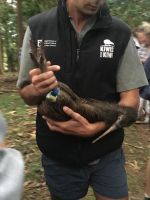Dogs, people and kiwi
Kiwi smell delicious to dogs and people don’t realise just how enticing this can be.
Northland is a stronghold for North Island Brown Kiwi where they are found in a wide variety of habitats – scrubby tea tree, exotic and native forests, pasture with gorse, reserves, and urban back yards. Sadly, the average life span of an adult kiwi in Northland is 14 years compared with around 40 years elsewhere. Research tells us that dogs are more of a threat to kiwi in Northland than stoats, ferrets, and cats. Given the high level of community conservation and pest control programmes taking place in Northland, it’s clear that interactions between dogs, kiwi, and people are complex.

Community engagement with kiwi before release in Whangarei Heads, March 2018

Dog attacks kill 7 kiwi in Kerikeri

Whangarei Heads kiwi release March 2018
The objective of our research was to identify and examine the range of viewpoints held on the issue of “dogs preying on kiwi” in Northland; focussing on people with strong views about dog ownership, pig hunting, conservation, and pest control. We interviewed 27 participants from the Kerikeri/ Russell region in the first year of this research and four viewpoints were identified:
- Conservation advocates: value kiwi and believe they have the right to live where they have always lived; advocates for pest control and monitoring kiwi; encourage support from the community to care for kiwi; believe that kiwi need protection outside DOC sanctuaries
- Family-centric – dogs with jobs: live rurally; dogs are an essential part of their life – either as working or recreational (pets, hunting dogs) companions; dogs are exercised as part of their daily life or through pig hunting; believe dogs and kiwi can co-exist through training and discipline rather than regulation or prohibition; care about kiwi
- Dog-centric – domestic: mostly urban, these pet owners value their dogs above native species, while believing they can co-exist; they believe they are responsible pet owners and that no further controls are needed; feel they have a right to own a dog and need somewhere to exercise their dogs
- Dog control enforcer: while this group may own a dog, they see it as a privilege rather than a right, and believe strongly that dogs should be controlled to protect kiwi; believe there would be benefits to Northland’s economy if kiwi numbers increase.
Delving further into the research, we explored a range of opinions on where kiwi should live – in sanctuaries or in the wild? All groups agreed that kiwi should not have to fend for themselves, but if they are outside sanctuaries, education and community involvement are essential to keep them safe. However, these actions alone may not significantly shift the dog ownership culture to reduce dogs preying on kiwi in Northland. Tighter enforcement of dog management regulations may be required to achieve this goal. The Council needs to build trust with community and ensure that the regulations are fit for purpose, i.e. that they have social licence to proceed.
A second year of research on dogs and kiwi has recently been carried out around the Kaitaia/Warawara forest areas. These results are still being analysed but a key difference with the Kerikeri/Russell data appears to be the concern about wandering dogs and the overwhelming support for kiwi and caring for native species over dogs.
